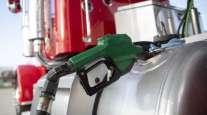Staff Reporter
Minnesota Senate Strikes Proposed Fuel Tax Hike

A proposed 20-cent hike to the fuel tax did not survive the scrutiny of the Minnesota Senate, which passed a transportation finance bill May 1.
Senate legislators passed a bill that strikes several provisions contained in a House transportation finance bill that passed April 29, including increases to the fuel tax, sales tax and vehicle registration tax (also known as the tab fee.) The House legislation included Gov. Tim Walz’s plan for a 20-cent fuel tax increase.
This isn’t a choice between a gas tax and no gas tax.
It’s about living in a state with safe, reliable transportation or one with crumbling roads and bridges that risk our safety and keep businesses away. #mngov #mnleg pic.twitter.com/J09uX8HSOp — Governor Tim Walz (@GovTimWalz) March 19, 2019
The Senate’s bill, which proposes a budget of $6.63 billion over two years, includes an appropriation of $38 million to add lanes to a 15-mile stretch of U.S. Route 212.
Instead of a fuel tax hike, the legislation presents a tax on the use of electric vehicle charging stations as a funding alternative. The bill proposes a tax of 5 cents imposed on each kilowatt hour of electricity delivered to an electric vehicle. The tax would become effective Jan. 1. A kilowatt hour is a unit of measurement equal to the amount of energy one would use if he or she kept a 1,000-watt appliance running for one hour.
“We are going to do it without raising your gas taxes, we’re going do it without raising your tab fees, [and] we’re going to do it without raising the sales tax on your car,” Sen. Scott Newman (R-Hutchinson), bill author and chairman of the Senate Transportation Finance and Policy Committee, said in a video a few minutes before the vote took place. “We are going to keep the money that is in our transportation system right now, rather than having it diverted and payable in various government programs.”
In addition to criticizing the proposed tax hike, opponents of the House bill said that the legislation suggested reallocating revenue to the general fund.
Minnesota Trucking Association President John Hausladen pointed out that the House legislation proposed eliminating revenue streams that would have bolstered the Highway User Tax Distribution Fund, which supports 100,000 miles of state, county and municipal roads. The revenue streams included a motor vehicle rental tax, a sales tax on short-term vehicle rentals and a portion of sales tax attributed to vehicle repair and replacement parts. The Minnesota Chamber of Commerce released a survey April 18 revealing that 64% of Minnesotans supported dedicating the sales tax on parts to transportation purposes.

Hausladen
“Action by the House underscores a fundamental reality: We need to do something to adequately fund our road and bridge infrastructure,” Hausladen told Transport Topics. “However, we don’t agree with the approach taken by the House. The Minnesota Trucking Association believes we need a balanced funding approach.”
Certain transportation leaders supported the governor’s plan to raise the fuel tax rate by 20 cents. The state’s current excise tax rate for diesel and gasoline is 28.5 cents per gallon. During a construction season kickoff event in early April, Minnesota Department of Transportation Commissioner Margaret Anderson Kelliher praised the funding plan.
MnDOT anticipates a deficit of $18 billion in funding over the next 20 years, which will stymie the agency’s asset management efforts and ability to plan for projects that can meet the needs of the state’s population.
On the American Society of Civil Engineers’ report card for Minnesota’s infrastructure, the state earned an overall C grade. Roads earned a D+, the poorest score on the card. Bridges received a C.
ASCE’s Minnesota Section supported the proposed fuel tax hike. After the report card came out in October, ASCE representatives began meeting with House and Senate leaders to present their findings and highlight the need for transportation investment.
Seth Spychala, outreach co-chair of ASCE’s Infrastructure Report Card Committee for Minnesota, said the 20-cent increase would have helped meet the state’s infrastructure needs.
“Our main goal with the report card was to give grades to the individual pieces of infrastructure and explain those grades. Part of the D+ for roads was we’ve identified a pretty significant funding gap required in the area of roads,” Spychala told TT. “We feel that the governor’s proposal and the House transportation finance bill provide that long-term investment in our infrastructure.”
The bill now faces a deliberation process between the House and the Senate, which need to present identical pieces of legislation to the governor.
If the bill passes, Minnesota would not be the first state in recent years to increase its fuel tax rates. In Ohio, legislators recently approved a 10.5-cent increase to the fuel tax. Alabama Gov. Kay Ivey on March 12 signed into law the Rebuild Alabama Act, which includes a fuel tax increase to support infrastructure projects.




